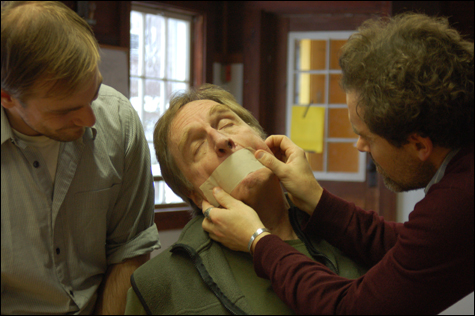
WELCOMING A SURROGATE DAD These orphans find a father figure in a dramatic way. |
For years, Philip (Michael Propster) has lived shut up in a sordid North Philadelphia apartment and in the vacuum of his older brother Treat's tyranny. Motivated by equal parts love, fear, fraternal jockeying, and his own repressed sense of loss, Treat (Kent Burnham) has kept Philip away from the world and frozen in a state of suspended childhood. The young men are grown-up orphans, abandoned first by a runaway father, then the death of their mother, and left since childhood to their own devices. It takes the arrival of another grown-up orphan to shake up their stagnation in Orphans, Lyle Kessler's acclaimed drama, on stage in an all-Equity production directed by Chase Bailey at the Seacoast Repertory Theatre, in Portsmouth.
Treat's and Philip's lives inspire mixed horror and comfort at humanity's capacity to adapt to the worst. Treat supports the both of them by petty thievery, while Philip is confined all day to the apartment, often the closet. Set designer Melissa Shakun plays up the squalor of their home by framing it with a huge, Expressionist wall of refuse, crumpled trash painted pale as if blanched by time and stasis. Here, the volatile, violence-prone Treat keeps Philip and their childhood power relationship static — and so, in his thinking, safe — by keeping him illiterate and fearful of the outside world, with its deadly allergens and bad people. Philip thus knows the world only by Treat's stories and TV movies, and his stunted level of development resembles autism: He has remarkable memory of what he hears and does killer impressions of movie stars, but is also quick to fixate and withdraw, clutching himself.
Enter Harold (Bill Humphreys), a well-dressed older man whom Treat has met at a girly bar, plied with booze, and induced back to the apartment to rob. Harold rambles drunkenly about his own screwed-up upbringing in an orphanage, and is quick to recognize Treat as a fellow "dead-end kid," as he puts it. Once he's passed out, Treat gets the idea to hold him for ransom, which doesn't work out as intended, and leads instead to Harold's establishment in the brothers' household as a new surrogate dad. Philip thrives under his liberating attentions — Harold encourages him to leave the house, and shows him where he lives on a map — while Treat competes both with Harold, as a rival father figure, and with Philip, as a rival brother for Harold's approval.
So begins the transformation of the household's surrogate-family structure, and the cast is particularly good at conveying the dynamics of this as it happens. Humphreys's Harold projects a sense of belonging in his world, his own skin, and his own emotional longings, in a way that immediately distinguishes him from Treat, who reacts to his openness like an edgy alley cat. Philip, on the other hand, takes to Harold immediately, and Propster does fine work balancing his weaknesses with his inherent intelligence and desire for human connection. He makes Philip both a comedic character (his recreations of TV spiels are priceless) and a poignant one; his slow rise in strength is beautifully wrought.